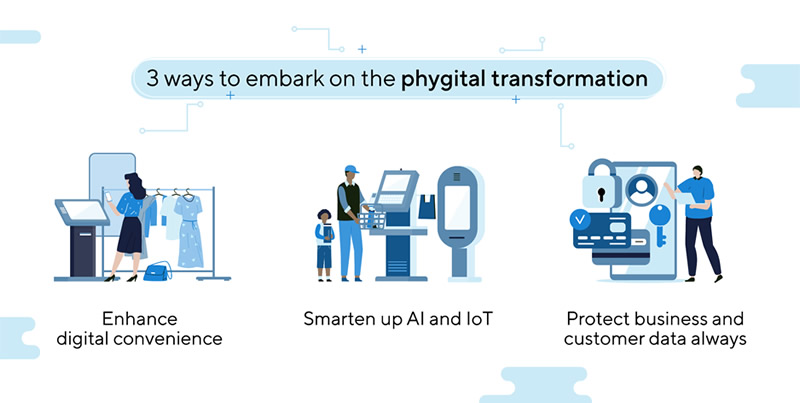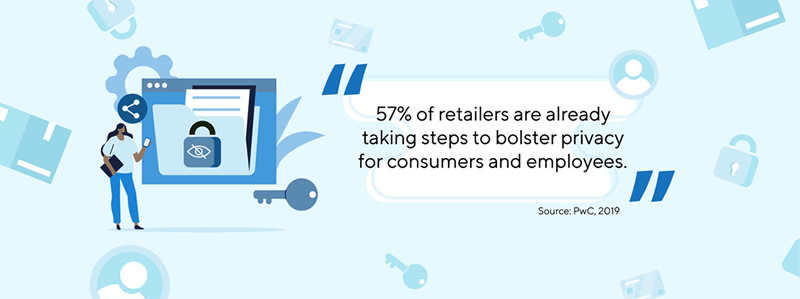
Apr 25, 2023
Let’s get phygital with smart, secure and reliable devices

In 2019, Gartner predicted that by 2023, e-commerce would cease to be a differentiator in the retail marketplace, reflecting “how the digital battleground has moved to the physical world”1. Indeed, retailers are now investing in ‘phygital’ retail strategies – blending physical spaces with digital experiences to engage shoppers anew.
Through 2022, most retailers will be boosting spending on store technology, increasing store counts, and experimenting with new formats as part of their digital transformation efforts2. To remain competitive, retail companies will have to up their phygital game – leveraging innovative and intuitive technology from ASUS Business to provide seamless and memorable shopping experiences for customers.

Enhance digital convenience
Physical stores remain a cornerstone of retail business. Retailers today set themselves apart from competitors with differentiated in-store experiences – and one way to do so is with digital.
Speed and convenience are king. Shoppers today want to move seamlessly through retail spaces, from browsing to checkout. According to McKinsey, 70% of companies will be using hybrid cloud or multi-cloud platforms as part of a distributed IT infrastructure by 2022, allowing data and processing to take place in the cloud but made available to devices quickly3. In the retail context, the cloud lets staff to have customer and inventory data at their fingertips via desktop, laptop or mobile devices, so they can anticipate and match customer needs.
An overlooked differentiator is the Point-of-Sale (PoS) solution. PoS terminals today are more than cash registers – they can help your company more efficiently take payments, track sales, manage inventory and generate reports. ASUS PoS retail solutions have been the building block for many retail customers in building their store of the future, with productivity and efficiency gains trickling down to the customer.
Smarten up AI and IoT
Artificial intelligence (AI) is valued at $400 billion to $800 billion for the retail industry globally4. AI retail applications are diverse, and the benefits numerous. The technology can help retailers to improve demand forecasting, make informed pricing decisions, optimise product placement, and manage inventory better. What that means: customers connecting with the right products at the right time.
And on the shop floor, intelligent devices can completely elevate the in-store experience. Imagine object recognition technology powered by AI at self-checkout stations that detects the weight of purchases and calculates pricing. With such a solution, ASUS IoT has been a gamechanger for retailers looking to streamline the checkout process and enhance the in-store shopping experience. Combined with the power and durability to operate in diverse retail environments, our products have helped dozens of retail clients boost efficiency and deliver seamless and enjoyable shopping to customers.
Protect business and customer data always
As with any digital effort, organisations must put cybersecurity first. As Deloitte put it, the retail industry is “an almost irresistible target” for cyberattacks, as cybercriminals hope to gain access to sensitive credit card information. As retailers adopt point-of-sale (POS), internet-of-things, and more advanced technologies, the industry’s attack surface also expands – exposing organisations to greater risk.

Many retailers (57%) are already taking steps to bolster privacy for consumers and employees, by designing security and privacy into IoT products (47%) and taking preventive measures against data breaches (43%)5. In the phygital retail environment, we’ve been helping retailers to secure their business and customer data through several means: endpoint security through ASUS IoT face recognition, devices with built-in enterprise-grade security, and secure access to all applications.
The future of retail is phygital. Customers now flexibly browse and shop products across online and offline channels. Brands that can be present on both channels, and who can offer convenient, accessible and customer-focused services have the best chance of winning the modern customer. Through a winning combination of reliable, smart and secure devices and solutions, retailers can confidently embark on the phygital transformation needed to achieve this.

